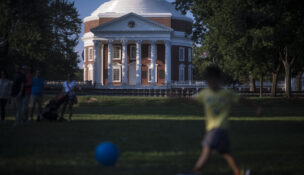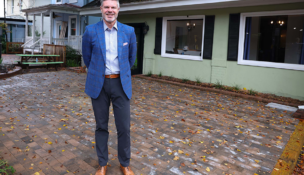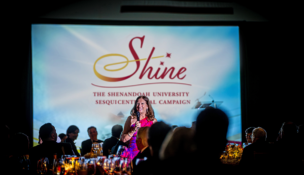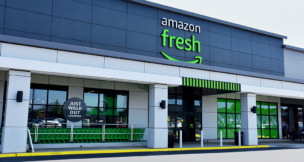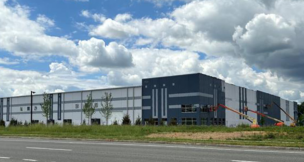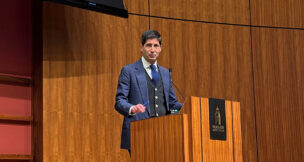Sowing seeds
VSU cross-pollinates 21st-century studies with agricultural expertise
Sowing seeds
VSU cross-pollinates 21st-century studies with agricultural expertise
High on a bluff on the north bank of the Appomattox River, opposite the city of Petersburg, Virginia State University (VSU) has been transforming lives for 137 years.
Starting out with 126 students in its October 1883 first class, Virginia State now has 4,385 undergraduate and graduate students enrolled. But Virginia State has expanded not just its student body, but also its mission. Responding to an ever-changing higher education landscape, VSU is creating academic programs to prepare students to be competitive in computer science, cybersecurity, engineering, food science, military science and health care, recently adding master’s degree programs in business administration and social work.

to be competitive in areas such as computer science,
cybersecurity, engineering, food science, military science and health care. Photo by Rick DeBerry
VSU today produces graduates with degrees in bioengineering, mass communications, managerial economics and scores of other subject areas not even dreamt of in 1883.
Chartered in 1882 as the Virginia Normal and Collegiate Institute to provide higher education opportunities for black people, VSU was designated HBCU (Historically Black College or University) of the Year in 2018 by HBCU Digest.
“Virginia State University demonstrated excellence across virtually all areas of the academic enterprise,” wrote Jarrett Carter Sr., editor of HBCU Digest, which was founded in 2010. “The institution showcased stability in leadership, productivity in research and outreach in its programs of strength — agriculture, education and business.
“Among all HBCUs, Virginia State was a top performer within the public higher education sector in attracting and retaining first-time college students, and it was among the most competitive institutions in excellence among its men’s and women’s athletic programs. Virginia State University was a model of success for all institutions, historically black or otherwise, during the last academic year.”
As one of the commonwealth’s two land-grant universities — Virginia Tech is the other one — VSU has historically been rooted in agricultural sciences, providing groundbreaking research and community outreach as part of a mission begun by the Morrill Act of 1862, which established publicly funded agricultural and technical educational institutions.
In its early years, the institution survived a few iterations and was even temporarily stripped of its collegiate status before eventually becoming Virginia State College in 1946 and earning university status in 1979.
Transforming lives

14th president,
was named
HBCU Digest’s
2017 HBCU Male President of
the Year. Photo by Sharda Byrd
“We provide young people access to what people may commonly call the American dream, the ability to transform your life and the lives of your family and the lives of your community. I don’t believe there’s another institution in Virginia that does that as well as we do,” says Makola M. Abdullah, the university’s 14th president, who was named HBCU Digest’s 2017 HBCU Male President of the Year.
“To have a school that still to this day has so many first-generation students, so many students that come from challenging backgrounds, to continue to provide high-quality professionals and to outperform our peers who are trying to do this work brings me great joy.”
HBCUs “play a really important role in exposing young people to professors, to staff, to friends who share a common affinity, while at the same time being quite diverse,” says Abdullah. “One of the things most students quickly understand is how really diverse the African American community is, which helps them figure out how they fit in and helps grow their self-efficacy so that they are ready to take on the world.”
Given VSU’s history as a university committed to providing transformative experiences to students from a wide range of cultural and socioeconomic backgrounds, it’s not surprising that its six-year strategic plan includes a call to provide programs that equip students to be “reformists, critical thinkers and community activists and leaders.”
Sitting in his office on the second floor of VSU’s Virginia Hall, looking out over the school’s riverfront perch on an early fall afternoon, Abdullah discusses the nature of education at VSU. “We are an opportunity university,” he explains. “This is a time when all higher education institutions understand that we have to better talk about our value proposition.” It’s no longer a given that most high school graduates will be encouraged to pursue college degrees, he says, so universities need to do a better job selling students on why they should attend and how a university education can help them reach their career goals.
VSU’s list of alumni includes accomplished individuals from a variety of disciplines. Among them is Christine Darden, a NASA mathematician, data analyst and aeronautical engineer referenced in Margot Lee Shetterly’s 2016 book “Hidden Figures.” The book depicts the team of African American women who calculated and solved mathematical problems that were critical in the 1960s space race.
Judge Roger Gregory, a VSU alumnus, is the first African American to serve as chief jurist for the U.S. Court of Appeals for the Fourth Circuit Court and is the only person to be appointed to a federal appeals court by presidents of two different parties. Another VSU alum, Klinette H. Kindred, is the first African American and first woman to be appointed as a bankruptcy judge in the Alexandria Division of the U.S. Bankruptcy Court for the Eastern District of Virginia.
A friend to farmers
While VSU’s curriculum includes high-tech STEM-related coursework in computer science, cybersecurity and engineering, the university still considers agricultural sciences and its land-grant mission work as priorities.
VSU’s College of Agriculture includes three land-grant directives, including teaching, research and outreach to communities and Virginia’s agricultural industry. Covering topics ranging from hospitality management and family consumer services to plant and soil sciences and pre-veterinary classes, the college’s courses benefit from its agricultural research station, Randolph Farm, a 416-acre agricultural learning center located just west of the main campus. The farm is the university’s hub for agricultural-related research and headquarters for its work in the Virginia Cooperative Extension program, a collaborative partnership with Virginia Tech.
The farm includes approximately 130 acres of irrigated cropland as well as 18,500 square feet of greenhouses and high tunnels or hoop houses, which are unheated greenhouses that allow farmers to extend their growing season. Randolph Farm is also home to newly renovated housing, breeding and veterinary care facilities, plus 75 acres of cross-fenced pasture to serve the animal production unit.
Research projects undertaken by VSU agricultural scientists include groundbreaking work to alleviate pressure on Virginia farmers suffering from falling commodity prices. A decadeslong dwindling tobacco economy and increasingly challenging climate issues have given rise to interest in alternative crops, including hemp production, which was approved by the General Assembly this year for industrial cultivation.
Virginia farmers flocked to VSU’s most recent agricultural “field day” forums about hemp cultivation, says Ray McKinnie, dean of VSU’s College of Agriculture.
“We are still very much in the research and development process in Virginia when it comes to hemp,” explains McKinnie. “We are looking at the breadth of varieties that suit and fit Virginia’s climate and soil, and then we will work through the best management practices to ensure maximum yield and production of those varieties. This is where the work of the land-grant university and the scientists will be of great advantage to farmers.”
Similarly, the university’s agricultural researchers have worked with small Virginia farmers to promote alternative crops showing growing market demand. Virginia farmers who once depended solely on tobacco are now planting fields of berries, chickpeas, mung beans and even ginger.

Herbert Brown Jr., a 2009 VSU graduate with a bachelor’s degree in agriculture business and economics, manages Browntown Farms with his father, Herbert Brown Sr., in Warfield. “My dad [retired from] tobacco farming in the early ’90s,” says Brown Jr. “The farm sat idle for a few years, but we’ve brought back 114 acres in rotation to grow vegetables like collard greens and a variety of berries. I owe Virginia State a lot as it relates to my educational experience, but also through the university’s small farm outreach, I’m always learning something new.”
Path makers
The university’s work with small farmers is not limited to rural agricultural cultivation. In 2017, the university initiated an Urban Agriculture Certificate Program, aimed at urban farming efforts such as hydroponic and greenhouse growing and backyard animal husbandry of chickens and rabbits. The 10-week program issued 55 certifications in its first year.
“As a land-grant university, VSU does remarkably important work and has critical connections into our communities,” says Virginia Deputy Secretary of Agriculture Frances Bradford. She points to the university’s aquaculture research at Randolph Farm, which includes 57 research and instruction ponds stocked with a variety of fish species. VSU’s aquaculture researchers operate an on-site fish hatchery, greenhouse-based tanks and an automated fish processing facility, where they have identified methods for raising disease-resistant species of fish such as tilapia and catfish.
VSU’s aquaculture research is part of the U.S. Department of Agriculture-funded Southern Regional Aquaculture Center, one of five centers in the country established by Congress to identify industry needs and design programs to directly impact commercial aquaculture development in the Southern Region.
“The aquaculture research is one of the things that excites us and is incredibly laudable about the work at Virginia State,” says Bradford, who also praised the university for its focus on urban agriculture programs. “VSU’s efforts on the urban side to help address food deserts and educate the local population about healthy food choices and provide access to those foods is remarkably important,” says Bradford.
Consistently mindful of its role as an opportunity university, VSU offers a small farm outreach program to provide training and technical assistance to more than 2,000 small, limited-resource and socially disadvantaged farmers and ranchers to improve their profitability. Through the program, farmers and students learn about the production of high-value produce like ginger and mung beans through cost-efficient and environmentally friendly techniques.
It’s an area, along with a host of other issues, addressed at the federal level in the 2018 Farm Bill, an $867 billion package titled the Agricultural Improvement Act.
The legislation includes support for minority farmers who have experienced discrimination in seeking access to credit, conservation and other farm programs. Over the next five years, about $50 million annually is earmarked for programs to support socially disadvantaged and veteran farmers and ranchers like those served in the VSU program. Also included in the act is $40 million in mandatory funding for scholarships in the next five years for the country’s land-grant institutions, including VSU, which is to receive about $500,000 this fiscal year, according to McKinnie. Further, the bill does away with a decades-old provision mandating that these HBCUs could carry over only 20% of federal funding year to year, a rule that wasn’t imposed on predominantly white land-grant universities.
Whether it’s achieved in agricultural or academic areas, building communities through educational opportunities remains priority No. 1 for Abdullah.
“We are very serious about making sure that Virginia State remains affordable,” he says. “We want to make sure that we provide quality career paths and quality entrepreneurship paths for young people. We find that to be one of our most important missions.”
-





